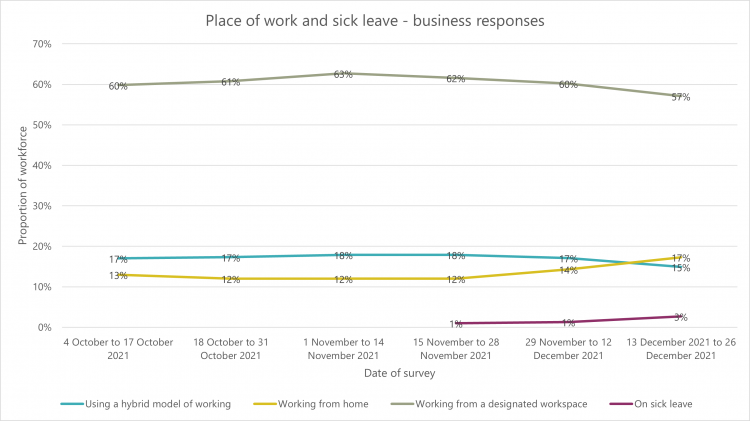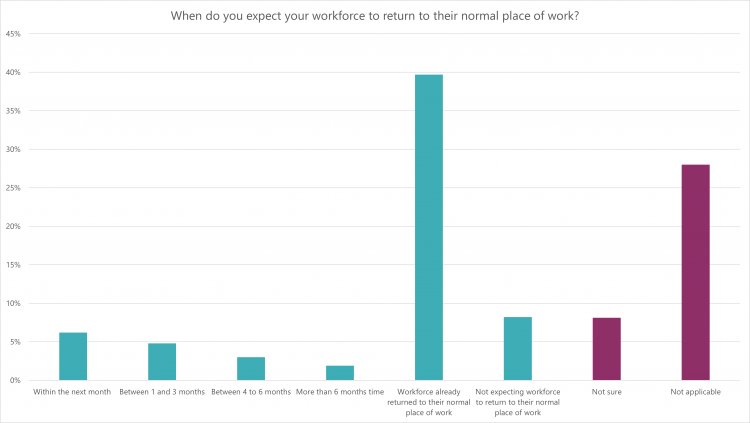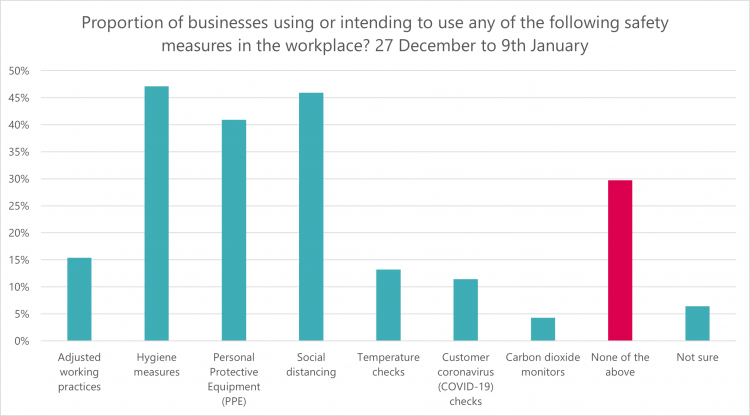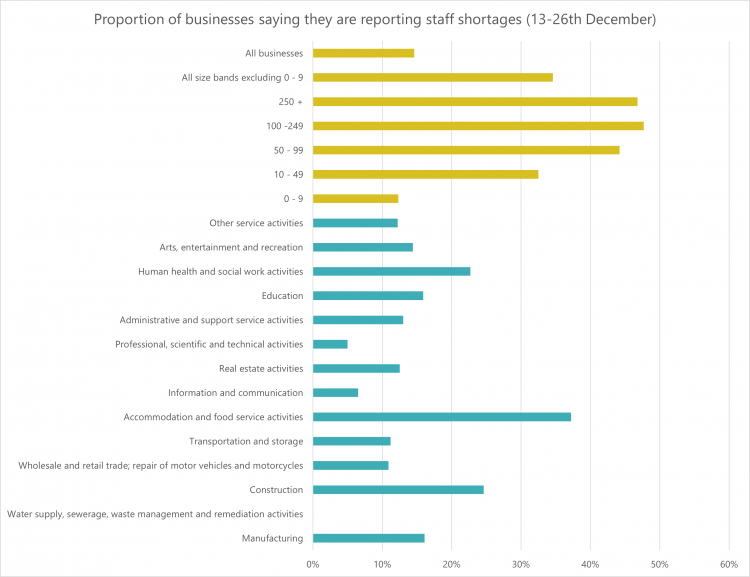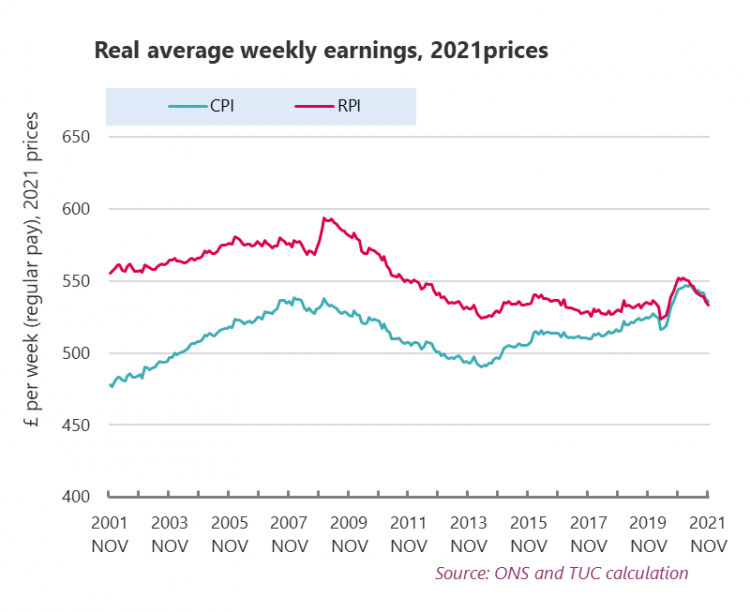A better normal
At long last a new normal is emerging in workplaces across the UK, as the vaccine programme provides greater protection against the threat of coronavirus. As we enter this new stage of transition from pandemic to endemic, the country is crying out for leadership and a practical plan to ensure that Britain at work is safe, secure and supported. We urgently need investment to boost economic growth that benefits every nation and region, and deliver fair shares and opportunities.
The government announced that Plan B restrictions will be lifted from the 24th of January, allowing for a greater return to normal life. Even before this latest announcement, when the requirement to ‘work from home if you can’ was in place, the latest data shows that between the 13th and 26th December, nearly 60 per cent of people were already working from their ‘normal’ workspace, with 15 per cent following a hybrid model, and 17 per cent working from home – significantly up on pre-pandemic levels.
But this new normal has exposed new problems. Fifteen per cent of businesses, and almost half of large businesses, are facing staff shortages, while workers continue to endure another pay squeeze, holding back the economic recovery we need. The failure to enshrine the success of the furlough scheme means that workers and businesses have no protection against potential difficulties over the transition period and face constant uncertainty. Public services face huge backlogs at a time when vacancy and sickness rates are high, and many staff are simply exhausted. Unequal access to hybrid and flexible working is entrenching new inequalities. And too many workplace environments remain unsafe, with almost a third of businesses reporting they have taken none of the most protective actions to reduce the impact of Covid. The continued failure to fix our sick pay system leaves workers still facing impossible choices between helping to stop workplace outbreaks and facing severe financial hardship.
These problems are not an inevitable consequence of the virus, but the result of government policy and planning failures, including the false economy of austerity and the high cost of letting inequality soar. Yet in the last two years we have learned a lot about how we can live and work with the virus, while minimising its impact on lives and livelihoods.
Thanks to the NHS, the successful vaccine programme has given us an opportunity to build back better in 2022, delivering the ambition of a high wage, high productivity economy, and the ability to enjoy our lives without fear. But government must seize and shape this opportunity, working with unions and businesses to deliver safe and decent work for everyone in 2022.
This report sets outs a plan to do that – to ensure that the new normal is a better and fairer one. It recommends that government should:
1. Bring unions and business together in a ‘working better’ taskforce to set out a clear plan for how to address skills and workforce shortages, and deliver the Government’s stated ambition for a high wage high productivity economy.
2. Embed fair flexibility with a plan to ensure that everyone has access to fair flexible working arrangements, wherever they work.
3. Build public sector resilience through investment in the public sector workforce – ensuring that public services can recover, address backlogs and cope with the pressure that any new variants will place on them.
4. Bolster workplace safety and mental health support so that everyone can work with confidence
5. Boost workers’ financial security, providing protection against any new variants by fixing sick pay, increasing Universal Credit and putting in place a permanent short-time working scheme to provide certainty; and
6. Banish global vaccine inequality – ending the shameful vaccine inequality that is helping to contribute to the development of new variants.
The latest data, from the ONS ‘Business Insights and Conditions Survey’ for the 13th to 26th December, shows that around 60 per cent of the workforce were working from their normal place of work.
While there was an uptick in homeworking following the ‘work from home’ order applying from the 13th December, this was relatively small, with only an additional three per cent of the workforce working from home.
Most businesses who have had workers not in their normal place of work during the pandemic have now seen those workers return – with 40 per cent of businesses saying that workers have done so (and around 30 per cent saying that the question is not relevant).
A significant proportion of businesses say they intend to use increased homeworking in the future – 17 per cent, although 38 per cent do not, and 30 per cent say the question is not applicable . But there is some evidence that working patterns may have stabilised.
However, this ‘new normal’ has brought with it new problems. As the chart above shows, Omicron drove a high level of sickness absence in December, with around three per cent of all workers off sick – the highest since June 2020. Due to the failures of the sick pay system, we estimate that around a quarter of a million workers were self-isolating during this period with no or inadequate sick pay.1
High levels of staff sickness may be related to the failure of many businesses to take action to improve workplace safety. Thirty per cent of businesses say they have taken none of a range of common measures – including social distancing – to improve safety at work.
- 1 TUC (17 January 2022) ‘TUC: Cutting self-isolation period won’t fix UK’s fundamental sick pay problem’ at https://www.tuc.org.uk/news/tuc-cutting-self-isolation-period-wont-fix-uks-fundamental-sick-pay-problem
Many businesses also report a shortage of skills. In September, A third of the companies that responded to the CBI’s July manufacturing survey were concerned that skills shortages would limit output, and half of consumer services firms said that labour shortages would limit investment in the year ahead – the highest figures since the 1970s.2
However, outside of some areas where unions are able to deliver significant increases, these conditions are not delivering sustained pay rises for workers. The latest labour market figures show that real pay is now £3 a week below its 2008 peak.
- 2 CBI (September 2021) A perfect storm, CBI insights on labour market shortages and what to do about it at https://www.cbi.org.uk/media/7159/20210906-a-perfect-storm-cbi-latest-labour-market-insights.pdf
Staff absences are just one element of a wider problem of staff shortages. 15 per cent of all businesses, and almost half of large businesses say that they are facing staff shortages, with particular issues in hospitality, health and construction.
The issues faced by workers and businesses are not an inevitable consequence of covid, but a failure of government policy to plan and react to changing conditions. This report sets out the steps government should take now to shape the new normal into one that delivers for workers.
Stay Updated
Want to hear about our latest news and blogs?
Sign up now to get it straight to your inbox

